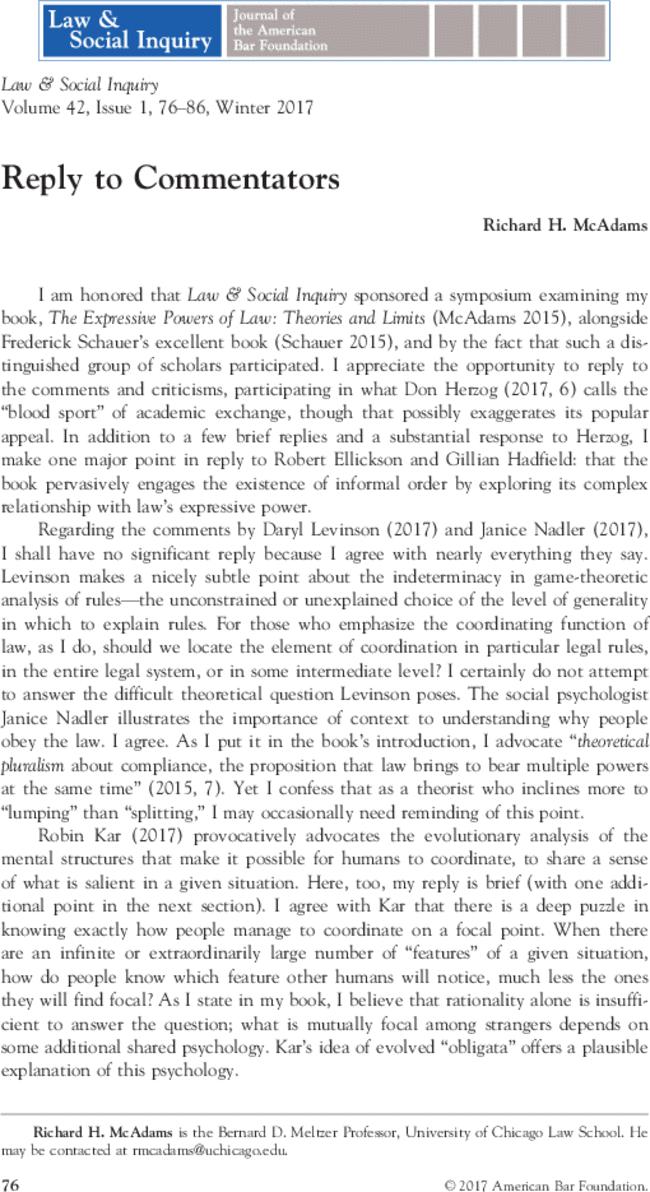Reply to Commentators
IF 1
2区 社会学
Q1 LAW
Law and Social Inquiry-Journal of the American Bar Foundation
Pub Date : 2017-01-19
DOI:10.1111/lsi.12282
引用次数: 1
Abstract
I am honored that Law & Social Inquiry sponsored a symposium examining my book, The Expressive Powers of Law: Theories and Limits (McAdams 2015), alongside Frederick Schauer’s excellent book (Schauer 2015), and by the fact that such a distinguished group of scholars participated. I appreciate the opportunity to reply to the comments and criticisms, participating in what Don Herzog (2017, 6) calls the “blood sport” of academic exchange, though that possibly exaggerates its popular appeal. In addition to a few brief replies and a substantial response to Herzog, I make one major point in reply to Robert Ellickson and Gillian Hadfield: that the book pervasively engages the existence of informal order by exploring its complex relationship with law’s expressive power. Regarding the comments by Daryl Levinson (2017) and Janice Nadler (2017), I shall have no significant reply because I agree with nearly everything they say. Levinson makes a nicely subtle point about the indeterminacy in game-theoretic analysis of rules—the unconstrained or unexplained choice of the level of generality in which to explain rules. For those who emphasize the coordinating function of law, as I do, should we locate the element of coordination in particular legal rules, in the entire legal system, or in some intermediate level? I certainly do not attempt to answer the difficult theoretical question Levinson poses. The social psychologist Janice Nadler illustrates the importance of context to understanding why people obey the law. I agree. As I put it in the book’s introduction, I advocate “theoretical pluralism about compliance, the proposition that law brings to bear multiple powers at the same time” (2015, 7). Yet I confess that as a theorist who inclines more to “lumping” than “splitting,” I may occasionally need reminding of this point. Robin Kar (2017) provocatively advocates the evolutionary analysis of the mental structures that make it possible for humans to coordinate, to share a sense of what is salient in a given situation. Here, too, my reply is brief (with one additional point in the next section). I agree with Kar that there is a deep puzzle in knowing exactly how people manage to coordinate on a focal point. When there are an infinite or extraordinarily large number of “features” of a given situation, how do people know which feature other humans will notice, much less the ones they will find focal? As I state in my book, I believe that rationality alone is insufficient to answer the question; what is mutually focal among strangers depends on some additional shared psychology. Kar’s idea of evolved “obligata” offers a plausible explanation of this psychology.

回复评论员
本文章由计算机程序翻译,如有差异,请以英文原文为准。
求助全文
约1分钟内获得全文
求助全文
来源期刊
CiteScore
2.10
自引率
0.00%
发文量
53

 求助内容:
求助内容: 应助结果提醒方式:
应助结果提醒方式:


